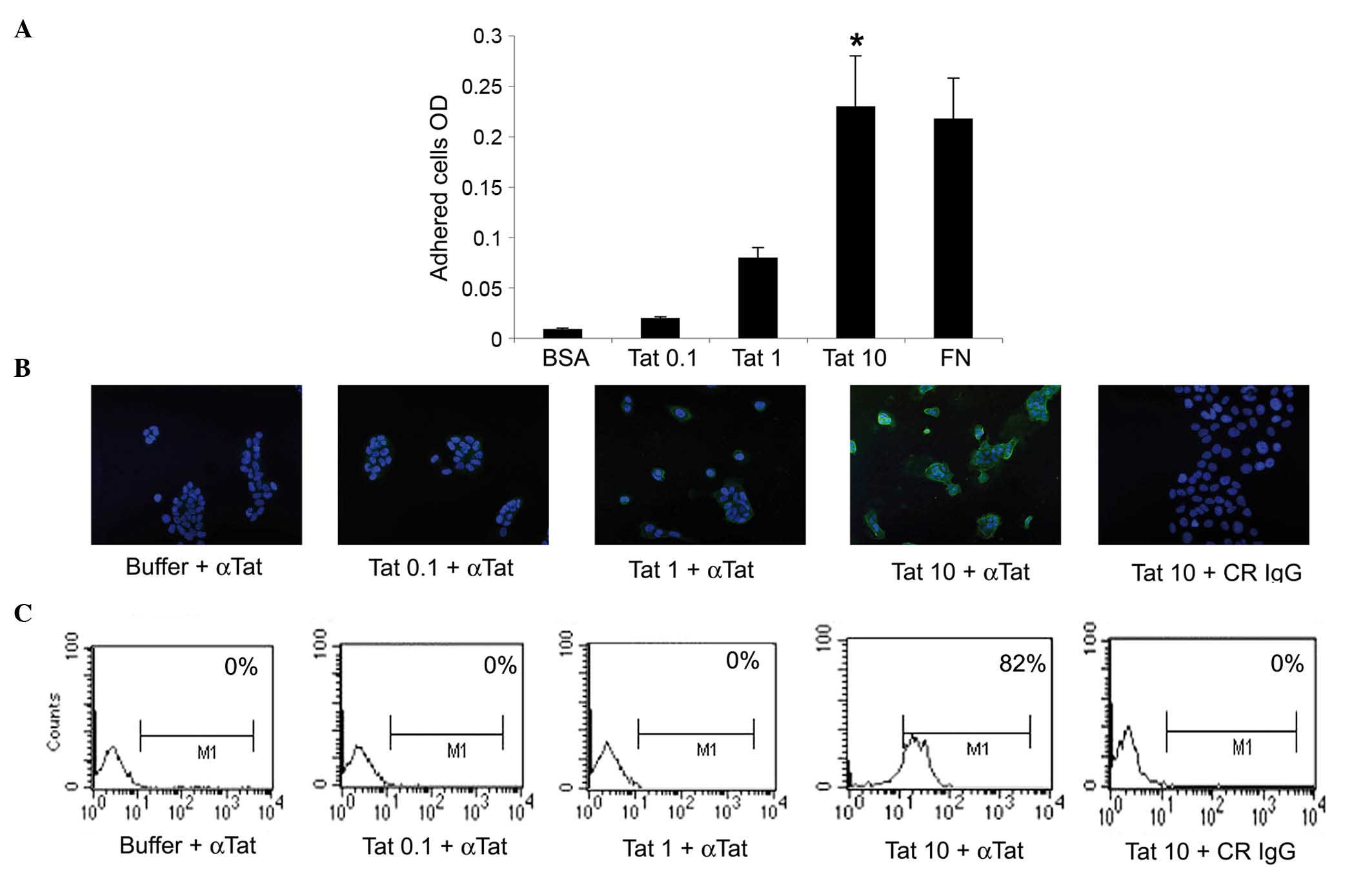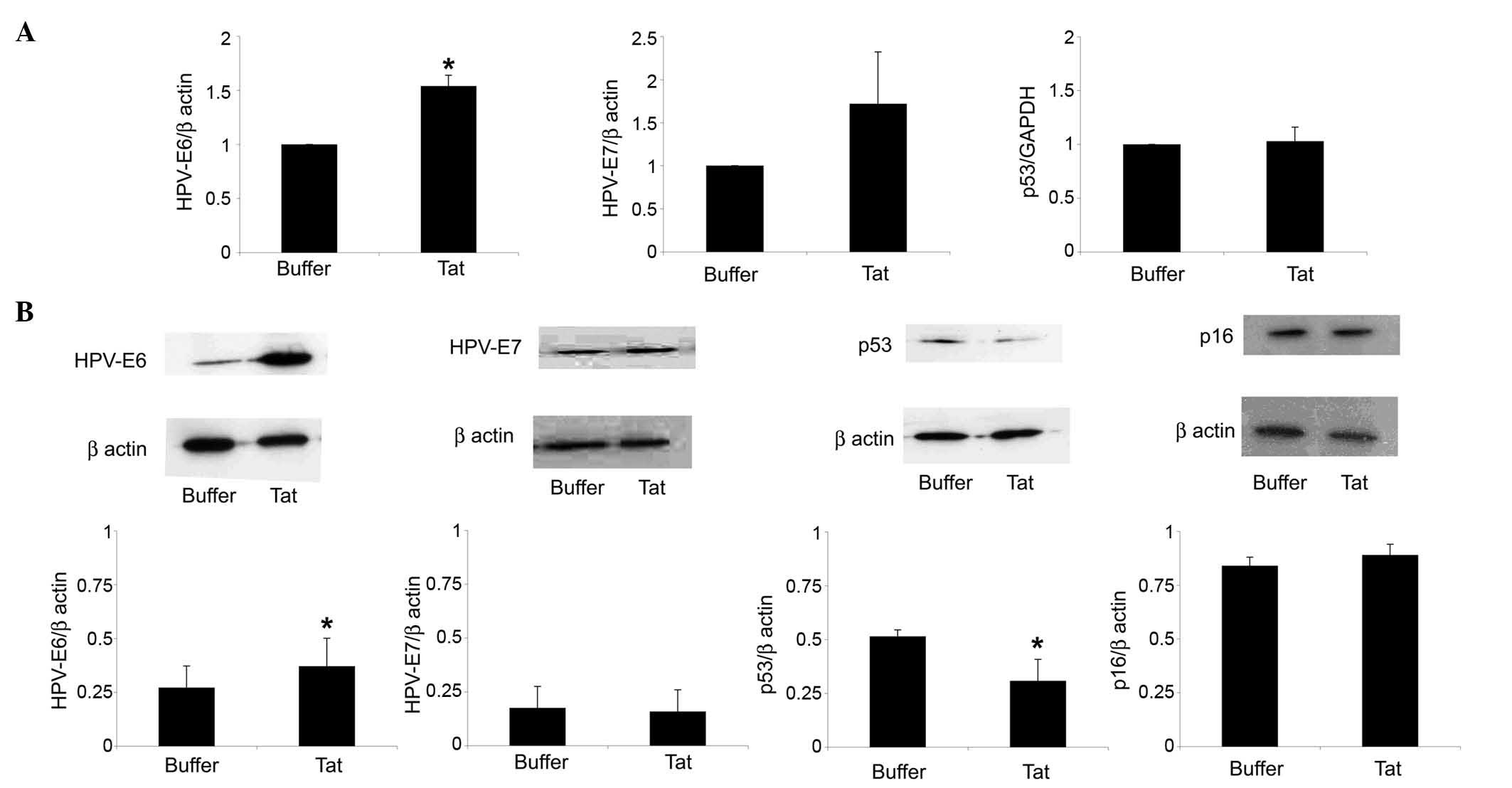|
1
|
Kang M and Cu-Uvin S: Association of HIV
viral load and CD4 cell count with human papillomavirus detection
and clearance in HIV-infected women initiating highly active
antiretroviral therapy. HIV Med. 13:372–378. 2012. View Article : Google Scholar : PubMed/NCBI
|
|
2
|
Kim RH, Yochim JM, Kang MK, Shin KH,
Christensen R and Park NH: HIV-1 Tat enhances replicative potential
of human oral keratinocytes harboring HPV-16 genome. Int J Oncol.
33:777–782. 2008.PubMed/NCBI
|
|
3
|
Pol SB Vande and Klingelhutz AJ:
Papillomavirus E6 oncoproteins. Virology. 445:115–137. 2013.
View Article : Google Scholar : PubMed/NCBI
|
|
4
|
Shen R, Richter HE and Smith PD: Early
HIV-1 target cells in human vaginal and ectocervical mucosa. Am J
Reprod Immunol. 65:261–267. 2011. View Article : Google Scholar : PubMed/NCBI
|
|
5
|
Barillari G and Ensoli B: Angiogenic
effects of extracellular HIV-1 Tat protein and its role in the
pathogenesis of AIDS-associated Kaposi's sarcoma. Clin Microbiol
Rev. 15:310–326. 2002. View Article : Google Scholar : PubMed/NCBI
|
|
6
|
Henning TR, Kissinger P, Lacour N,
Meyaski-Schluter M, Clark R and Amedee AM: Elevated cervical white
blood cell infiltrate is associated with genital HIV detection in a
longitudinal cohort of antiretroviral therapy-adherent women. J
Infect Dis. 202:1543–1552. 2010. View
Article : Google Scholar : PubMed/NCBI
|
|
7
|
Calil LN, Edelweiss MI, Meurer L, Igansi
CN and Bozzetti MC: p16 INK4a and Ki67 expression in normal,
dysplastic and neoplastic uterine cervical epithelium and human
papillomavirus (HPV) infection. Pathol Res Pract. 210:482–487.
2014. View Article : Google Scholar : PubMed/NCBI
|
|
8
|
Fanales-Belasio E, Moretti S, Nappi F,
Barillari G, Micheletti F, Cafaro A and Ensoli B: Native HIV-1 Tat
protein targets monocyte-derived dendritic cells and enhances their
maturation, function, and antigen-specific T cell responses. J
Immunol. 168:197–206. 2002. View Article : Google Scholar : PubMed/NCBI
|
|
9
|
Barillari G, Iovane A, Bacigalupo I,
Palladino C, Bellino S, Leone P, Monini P and Ensoli B: Ritonavir
or saquinavir impairs the invasion of cervical intraepithelial
neoplasia cells via a reduction of MMP expression and activity.
AIDS. 26:909–919. 2012. View Article : Google Scholar : PubMed/NCBI
|
|
10
|
Suh DS, Kim SC, An WG, Lee CH, Choi KU,
Song JM, Jung JS, Lee KS and Yoon MS: Differential apoptotic
response in HPV-infected cancer cells of the uterine cervix after
doxorubicin treatment. Oncol Rep. 23:751–756. 2010.PubMed/NCBI
|
|
11
|
Livak KJ and Schmittgen TD: Analysis of
relative gene expression data using real-time quantitative PCR and
the 2(−Delta Delta C(T)) Method. Methods. 25:402–408. 2001.
View Article : Google Scholar : PubMed/NCBI
|
|
12
|
Bachman H, Nicosia J, Dysart M and Barker
TH: Utilizing fibronectin integrin-binding specificity to control
cellular responses. Adv Wound Care (New Rochelle). 4:501–511. 2015.
View Article : Google Scholar : PubMed/NCBI
|
|
13
|
Engelholm LH, List K, Netzel-Arnett S,
Cukierman E, Mitola DJ, Aaronson H, Kjøller L, Larsen JK, Yamada
KM, Strickland DK, et al: uPARAP/Endo180 is essential for cellular
uptake of collagen and promotes fibroblast collagen adhesion. J
Cell Biol. 160:1009–1015. 2003. View Article : Google Scholar : PubMed/NCBI
|
|
14
|
Mwakigonja AR, Torres LM, Mwakyoma HA and
Kaaya EE: Cervical cytological changes in HIV-infected patients
attending care and treatment clinic at muhimbili national hospital,
Dar es salaam, Tanzania. Infect Agent Cancer. 7:32012. View Article : Google Scholar : PubMed/NCBI
|
|
15
|
Conesa-Zamora P, Doménech-Peris A,
Orantes-Casado FJ, Ortiz-Reina S, Sahuquillo-Frías L, Acosta-Ortega
J, García-Solano J and Pérez-Guillermo M: Effect of human
papillomavirus on cell cycle-related proteins p16, Ki-67, Cyclin
D1, p53 and ProEx C in precursor lesions of cervical carcinoma: A
tissue microarray study. Am J Clin Pathol. 132:378–390. 2009.
View Article : Google Scholar : PubMed/NCBI
|
|
16
|
Coleman N, Greenfield IM, Hare J,
Kruger-Gray H, Chain BM and Stanley MA: Characterization and
functional analysis of the expression of intercellular adhesion
molecule-1 in human papillomavirus-related disease of cervical
keratinocytes. Am J Pathol. 143:355–367. 1993.PubMed/NCBI
|
|
17
|
Guo J, Si L and Wang Y: An in situ study
on immunostimulatory molecules in cancer cells within the cervical
carcinoma tissues. Zhonghua Yi Xue Za Zhi. 80:342–345. 2000.(In
Chinese). PubMed/NCBI
|
|
18
|
Chancey CJ, Khanna KV, Seegers JF, Zhang
GW, Hildreth J, Langan A and Markham RB: Lactobacilli-expressed
single-chain variable fragment (scFv) specific for intercellular
adhesion molecule 1 (ICAM-1) blocks cell-associated HIV-1
transmission across a cervical epithelial monolayer. J Immunol.
176:5627–5636. 2006. View Article : Google Scholar : PubMed/NCBI
|
|
19
|
Nkwanyana NN, Gumbi PP, Roberts L, Denny
L, Hanekom W, Soares A, Allan B, Williamson AL, Coetzee D, Olivier
AJ, et al: Impact of human immunodeficiency virus 1 infection and
inflammation on the composition and yield of cervical mononuclear
cells in the female genital tract. Immunology. 128(Suppl 1):
e746–e757. 2009. View Article : Google Scholar : PubMed/NCBI
|
|
20
|
Mitchell C, Balkus JE, McKernan-Mullin J,
Cohn SE, Luque AE, Mwachari C, Cohen CR, Coombs R, Frenkel LM and
Hitti J: Associations between genital tract infections, genital
tract inflammation, and cervical cytobrush HIV-1 DNA in US versus
Kenyan women. J Acquir Immune Defic Syndr. 62:143–148. 2013.
View Article : Google Scholar : PubMed/NCBI
|
|
21
|
Xie M, Hu A, Luo Y, Sun W, Hu X and Tang
S: Interleukin-4 and melatonin ameliorate high glucose and
interleukin-1β stimulated inflammatory reaction in human retinal
endothelial cells and retinal pigment epithelial cells. Mol Vis.
20:921–928. 2014.PubMed/NCBI
|
|
22
|
Thichanpiang P and Wongprasert K: Green
tea polyphenol epigallocatechin-3-gallate attenuates TNF-α-induced
intercellular adhesion molecule-1 expression and monocyte adhesion
to retinal pigment epithelial cells. Am J Chin Med. 43:103–119.
2015. View Article : Google Scholar : PubMed/NCBI
|

















